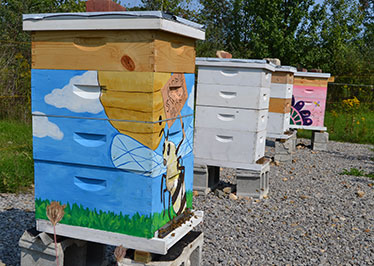 This story was originally published in the March 2021 issue of The GēDUNK, Grove City College’s alumni magazine.
This story was originally published in the March 2021 issue of The GēDUNK, Grove City College’s alumni magazine.
Twenty-twenty was a bee-building year for the Oliver Apiary, the honey bee yard and certified pollinator garden on Grove City College’s campus.
A year and a half ago, the apiary wasn’t much more than an undeveloped plot of land on the edge of the student parking area known as “Siberia,” littered with chunks of concrete dumped there over the years. This fall, the certified pollinator friendly garden yielded troves of data for farmers and scientists, invaluable experience for student researchers, an opportunity for interdisciplinary cooperation – and a modest harvest of the GCC Bees honey.
The apiary features carefully selected pollinator friendly flora planted in beds around four bee boxes, home to tens, perhaps hundreds of thousands of bees, and penned in by an electric fence to keep would-be Yogis and Poohs away.
The Bee Project at GCC and the apiary are the brainchild of Dr. Tracy S. Farone, a professor of Biology and veterinarian. Her interest in bees was sparked by a 2016 FDA mandate meant to curb the growing problem of resistance to antibiotics due to overuse that required a veterinarian’s prescription for medicines that beekeepers commonly, and sometimes excessively, used to treat their bees. It created a unique problem for doctors, beekeepers, and farmers, Farone said. Farmers depend on bees to pollinate crops and that depends on healthy hives.
“Bees are responsible for pollinating one third of the food we eat. They are the most important agricultural animal in the world and contribute $15 to 20 billion to the national economy,” Farone said. The industrious insects are also a bellwether for something bigger. “The health of bees is a sentinel of how well our environment is doing.”
But veterinarians trained to care for pets and livestock had little experience with bees. A desire to correct that problem led Farone to spend the spring of 2019 on sabbatical from her teaching work at Grove City College to study beekeeping in Europe, where hive health has been a priority for decades, and in the U.S. “I’ve had my nose in thousands of hives,” she said, from commercial and research apiaries in France and Scotland to huge agricultural operations that haul thousands of bee colonies from harvest to harvest across the country like migrant workers, to her own backyard, where she has several colonies. She came back to campus with plans to set up a research and teaching apiary to study pollinator and honey bee health and provide information about bees to beekeepers, veterinarians, and the general public.
In the summer and fall of 2019, with the approval of the College, help from her husband, and a cadre of bio majors, seed money from apiary namesake (and former Pennsylvania Department of Conservation and Natural Resources Secretary) John Oliver, and donated seedlings from Meadville, Pa.-based Ernst Conservation Seeds, the garden was cleared, planted, and began to take shape.
A minor miracle helped populate the garden. While many beekeepers lose 30 to 40 percent of their bees over a winter, Farone’s backyard bees thrived. In spring of 2020, she was able to split her own hive eight times and supply all the bees needed for the College. “We were really blessed,” she said.
By midsummer, Farone and her student research assistants were deep into studying and caring for the bees. Clad in white beekeeping jackets and veiled hoods, they regularly inspected the hives, one bee-laden honeycombed frame at a time, to track the overall health and progress of the industrious insects. Their data and observations, along with BroodMinder technology that tracks the hives on an hourly basis, are contributing to ongoing international research through two mega studies with Penn State University’s Center for Pollinator Research. That larger work will help predict survival rates for bees in similar locations and provide an understanding of how landscape impacts bee health.
Their ongoing research has already been featured in professional journals including the Journal of the American Veterinary Medical Association and Farone has become a “go to” source for the industry. She writes widely on the subject and now contributes monthly to Bee Culture magazine.
The academic harvest and the continued flourishing of the College’s colony would be enough to point to a successful first year for the garden. But this fall, the apiary produced about 25 pounds of honey, despite a drought that impacted production and the very conservative call to leave the bees more than enough honey to survive the winter. It was donated to the Alumni Office to present as special gifts.
While the garden is primarily a Biology research project, several other academic departments have been involved in the ongoing work. Communication and Visual Arts students were able to create box designs attractive to bees utilizing color theory and begin shooting video for a documentary on the garden. Electrical Engineering students are designing and testing solar panels to provide electricity at the site and the Physics Department’s electron microscope was used to photograph bees. Botany students helped out with a plant survey of the area and entomology students evaluated insect species collected at the garden.
That transcendent, interdisciplinary aspect of the GCC Bee Project reflects the big idea behind the work Farone and her students have been involved in. The garden, she said, is dedicated to the concept of One Health, an approach based on the idea that the health of people is connected to the health of animals and the environment.
“Everything under creation is interrelated,” Farone said.
For more information on how you can sponsor the GCC Bee Project or the Oliver Apiary, please contact Kelly Conger, director of foundation and corporate relations, at 724-458-2991 or klconger@gcc.edu.